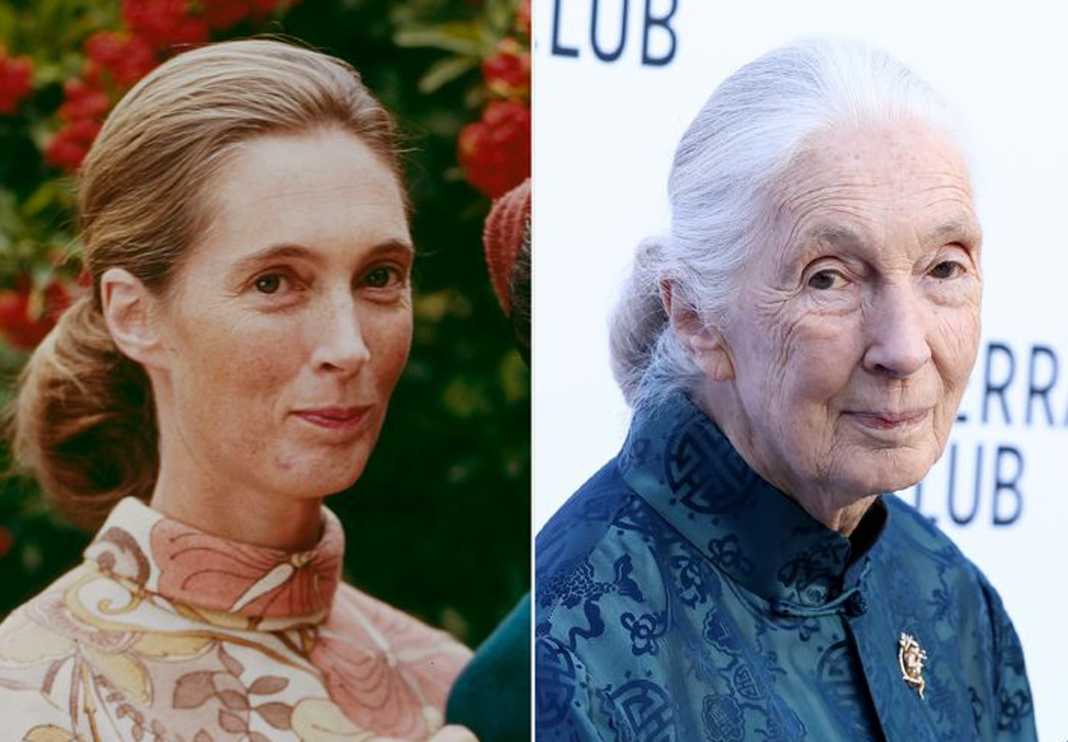At 91, legendary primatologist Dr. Jane Goodall reflects on being underestimated for her gender, objectified for her looks, and how she turned societal limitations into tools of empowerment — all while never losing sight of her greater mission: the protection of nature and the belief in human potential.
A voice that changed the conversation
For over six decades, Dr. Jane Goodall has been a towering figure in science and conservation. But before she became the world’s most recognized primatologist, she was a young woman with a dream few believed in — and even fewer supported. On a recent episode of the Call Her Daddy podcast, the 91-year-old icon opened up about the struggles and surprising advantages she encountered early in her career.
Goodall recounted how, as a young woman in post-war Britain, her ambitions of studying animals in Africa were often dismissed as “ridiculous.” She didn’t have formal scientific training at the time, nor the financial means. “You don’t have money,” she was told. “And you’re just a girl.”
Raised in a “house of women” during an era shaped by global conflict, Goodall found solace — and purpose — in nature. “There was no television then,” she said. “So, I spent my childhood outside. That’s where my love for animals and the wild world began.”
That love would become a lifelong pursuit. And despite the many societal roadblocks, Goodall pushed forward with what she described as dogged determination and a little help from a woman who believed in her more than anyone else: her mother.
:max_bytes(150000):strip_icc():focal(749x0:751x2):format(webp)/jane-goodall-then-and-now-052125-6220c6711adc4a66b367fe94b36c6bff.jpg)
Turning objectification into opportunity
One of the most revealing moments in the podcast came when host Alex Cooper asked Goodall about her first appearances in National Geographic. These early media spotlights played a crucial role in funding her research — but they also came with intense scrutiny of her appearance.
Goodall remembered the commentary from some of her male peers at the time. “Some of the jealous male scientists said, ‘She’s only getting attention because of her looks. They wouldn’t put her on the cover if she didn’t have nice legs.’” She didn’t let the comments deter her. In fact, she used them to her advantage.
“So, if my legs were getting me the money, thank you legs,” she said, with a knowing smile. “If you look at those covers, they were jolly nice legs.”
In today’s context, such remarks would be widely condemned. But Goodall views them through the lens of a different era — one where women were rarely seen or heard in serious scientific fields. Rather than feel diminished by the objectification, she found a way to use it as leverage to fund her real work: groundbreaking chimpanzee research in Tanzania’s Gombe Stream National Park. “I just wanted to get back to the chimps,” she said simply.
:max_bytes(150000):strip_icc():focal(499x0:501x2):format(webp)/Jane-Goodall-1965-052125-9056c22210ca4054b37a4cb420407cef.jpg)
The quiet power of belief
Beneath Goodall’s trailblazing career is a quieter story of resilience — the kind shaped by encouragement at key moments. Throughout her life, her mother’s unwavering belief served as a guiding light.
“She said, if you really want to do something like this, you’re going to have to work really hard. Take advantage of every opportunity. And if you don’t give up, hopefully you find a way,” Goodall shared. That advice became not just personal inspiration but a message she has carried “around the world, particularly in disadvantaged communities.”
Even now, as she travels tirelessly to speak with students and activists, Goodall often invokes her mother’s wisdom — not as a nostalgic note, but as a blueprint for self-belief. “I wish mom was alive,” she said emotionally. “And maybe she’s listening. The number of people who say, ‘Jane, I want to thank you. You’ve taught me that because you did it, I can do it too.’ That means everything.”
:max_bytes(150000):strip_icc():focal(665x0:667x2):format(webp)/Jane-Goodall-052125-1a945c8a36c24e9590acb1961ac57234.jpg)
A legacy larger than fame
Despite the media spotlight — and the occasional fixation on her looks — Goodall has never been driven by celebrity. Her enduring mission has always been about conservation, education, and inspiring change. Over the decades, she has evolved from a field scientist into a global advocate for the planet, founding the Jane Goodall Institute and launching youth empowerment initiatives like Roots & Shoots. Even at 91, her work continues. Goodall is a regular speaker at global climate forums, a sought-after thought leader in biodiversity policy, and an enduring symbol of compassion in science. But she remains humble, often brushing aside accolades in favor of what still needs to be done. “I had to prove myself every step of the way,” she said. “And I did.”
Beyond the cover: Rewriting what success looks like
Goodall’s story is not just about scientific achievement — it’s about rewriting the rules of who gets to be seen, heard, and taken seriously. In reflecting on her younger self, she offers not regret, but clarity. “We all live in different eras, with different expectations,” she said. “Back then, I took what I was given and made it work for the greater good.”
Her message, delivered with the poise of a woman who has nothing left to prove, is simple but powerful: true success lies not in conforming to expectations, but in rising above them.



